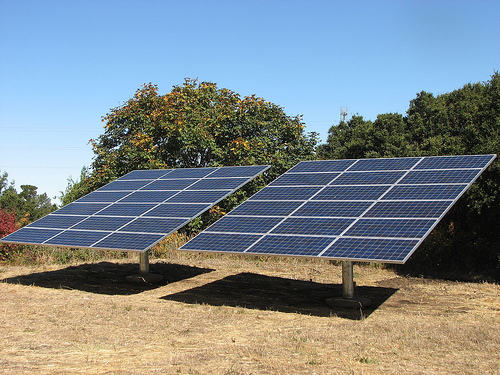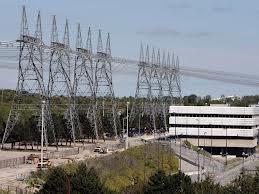By Ray Rivers
BURLINGTON, ON. Let’s debunk the nonsense about the high cost of renewable energy in Ontario. Gord Miller, Ontario’s Independent Environmental Commissioner, estimated that, for 2010, the total cost for wind and solar was a mere 3% of a household’s total ‘energy used’. Since your household bill includes other charges, such as delivery and debt recovery,that translates into just over one percent.

There are thousands of small solar panel installations like this across the province – they work very well and in many cases provide revenue for the owners.
So, McGuinty’s Green Energy Act is not why your hydro bill keeps climbing and it’s certainly not going to bankrupt the province, as the scare mongers would have you believe. That rising tide of hydro bills has to do with more mundane matters like updating, improving, maintaining and expanding our grid infrastructure; and building new power plants even as electricity demand has been falling.
Yes, there is the half-billion dollars, or so, wasted on the cancelled gas plants – but that pales with what we’ve spent on the nukes. Professor Jose Etcheverry, with the Faculty of Environmental Studies at York University, sums up Ontario’s nuclear experience as “it always costs much more and takes longer than originally budgeted”. He points out that $1 billion is being shelled out to consultants just to estimate the cost of fixing our newest nuclear plant at Darlington. And like the cancelled gas plants we won’t see a kilowatt of energy out of that money.
Canada was proud to be only the second nation ever when, in 1945, we achieved a self-sustaining chain reaction with a tiny reactor at Chalk River, Ontario. But it was only seven years later, in 1952 when Chalk River became the site of Canada’s first nuclear accident. And there was another one in 1958, and then there have been three more serious Canadian accidents after that. Fortunately there were no direct fatalities from any of these mishaps.
As the professor points out, Ontario’s experiment with nuclear power has been costly. And there is still no plan or budget to deal with the nuclear waste we have been storing on-site in big pools, pools like the ones at Japan’s Fukushima nuclear plant. Leaking radioactive water from that disabled plant, now the worst nuclear accident in history, is a real environmental concern, which nobody should take lightly as we watch the poisonous plume of seawater approach the shores of North America.
Ontario is a pretty stable seismic location to situate something like a nuclear plant. But it wasn’t the earthquake which caused the crisis in Japan, it was the flooding tidal wave. And if we learned anything this year, it is that we, too, are powerless against floods when nature decides to unleash its furry. Then, there is always the chance that something else will go wrong as it did at Three Mile Island and Chernobyl or at Chalk River. And what about the chance that some terrorist makes her way inside the reactor building?

Ontario has a number of nuclear energy reactors – they were expensive to build and are very expensive to maintain.
We get half of our electricity in this province from nuclear energy and the facilities have been pretty reliable of late. But we know there will be more problems, requiring even more money to be poured into these reactors as they age and decay. And then there are the unknown costs of eventually decommissioning the plants and the contaminated sites they sit on. So the chattering class of pundits, taking shots at renewable energy as being too expensive, are either lying to us or have their heads stuck where the sun doesn’t shine.
Speaking of the sun, I installed a solar panel last year. Imagine how much different our power needs would be if everybody had one of those on their roof. Sure, you need to back-up these renewable sources with gas plants, at least until the engineers can get their act together and develop ways of storing surplus energy – with capacitors or hydrogen gas or something else. And there will always be some bean-counter crying ‘unreliable’ or ‘inefficient’ when she spots below-capacity generation on a cloudy and calm day – but that is the nature of the beast. These systems only work when the conditions permit, but work they do.
Wind turbines and solar panels are as safe as electrical generation gets – something we can never say about a nuclear chain reaction. And the costs of buying, installing, maintaining and de-commissioning renewables are relatively inexpensive. I know there are people who give themselves stress headaches, worrying about a wind turbine, half a kilometer away, producing a whoosh of wind only they can hear. But really they need to get a grip – for example, they should take comfort in knowing a wind mill will never threaten them with the China Syndrome.
 Ray Rivers earned an economics degree at the University of Western Ontario, taught in New Zealand and earned a Master’s degree in economics at the University of Ottawa. His 25 year stint with the federal government included time with Environment, Fisheries and Oceans, Agriculture and the Post office. Rivers is active with ratepayers groups, a food bank, environmental organizations, community journalism and policing. He has run for municipal and provincial government offices and held executive positions with Liberal Party riding associations.
Ray Rivers earned an economics degree at the University of Western Ontario, taught in New Zealand and earned a Master’s degree in economics at the University of Ottawa. His 25 year stint with the federal government included time with Environment, Fisheries and Oceans, Agriculture and the Post office. Rivers is active with ratepayers groups, a food bank, environmental organizations, community journalism and policing. He has run for municipal and provincial government offices and held executive positions with Liberal Party riding associations.



















The Brits who bought Bruce now are proposing to bury the nuclear waste near Lake Huron. This of course would be a cheap way for them to save money and show that they don’t give a fig about the Great Lakes.
Since the waste (due to their ownership) is British waste, it belongs in Britain.
Perhaps we could induce Porter Airlines to get the hell off Toronto Island and to shift their business plan to flying the nuclear waste “over ‘ome.”
I agree completely with your comments Ray. Living in a nuclear free nation such asNew Zealand, the potential harms of nuclear power greatly outweigh the benefits, especially when there are other alternatives available. Unfortunately NZ still has yet to capitalise on the abundance of natural power options, especially hydro and thermal, and still has coal as its biggest source of power. So a bit of a walking contradiction. What I want to know is why hasn’t anyone adopted a common sense approach such as the one I saw in LA where large concrete parking lots are covered with solar power panels which not only protect the cars from the hot sun, but provide power to the grid? There’s a free million dollar idea for any keen entrepreneur.
I found this to be a very interesting and inciteful article.
Thanks for the food for thought!
I would bet that the cost of wind power @ 82 cents per kwh that the Liberal government contracted does not come close to the total kwh cost of nuclear power. How can one say that spending 1 billion dollars on studying the safety and efficiency of nuclear power is a waste of taxpayers money, when nuclear provides 50% of our electricity and yet try and justify a total cynical waste of $800,000,000 of taxpayers money